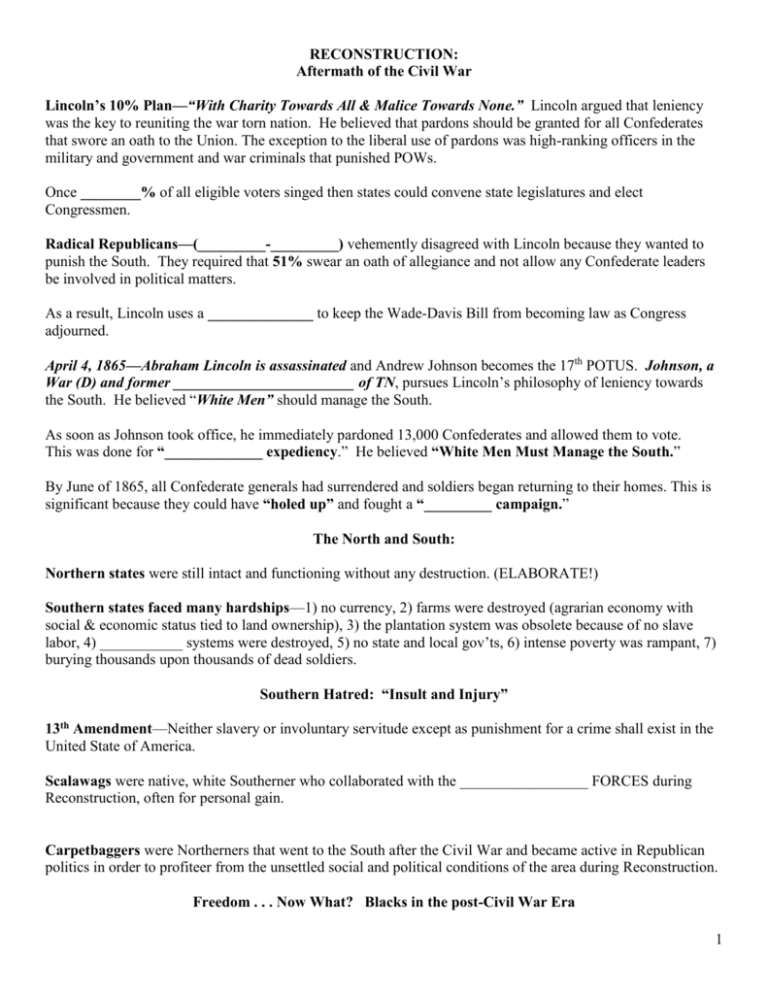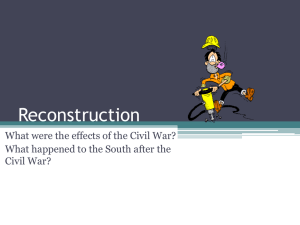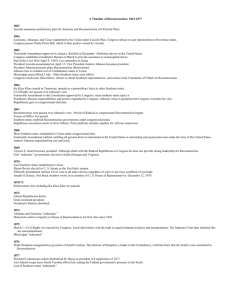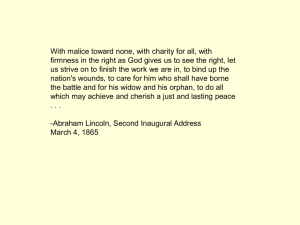Reconstruction Notes
advertisement

RECONSTRUCTION: Aftermath of the Civil War Lincoln’s 10% Plan—“With Charity Towards All & Malice Towards None.” Lincoln argued that leniency was the key to reuniting the war torn nation. He believed that pardons should be granted for all Confederates that swore an oath to the Union. The exception to the liberal use of pardons was high-ranking officers in the military and government and war criminals that punished POWs. Once ________% of all eligible voters singed then states could convene state legislatures and elect Congressmen. Radical Republicans—(_________-_________) vehemently disagreed with Lincoln because they wanted to punish the South. They required that 51% swear an oath of allegiance and not allow any Confederate leaders be involved in political matters. As a result, Lincoln uses a ______________ to keep the Wade-Davis Bill from becoming law as Congress adjourned. April 4, 1865—Abraham Lincoln is assassinated and Andrew Johnson becomes the 17th POTUS. Johnson, a War (D) and former ________________________ of TN, pursues Lincoln’s philosophy of leniency towards the South. He believed “White Men” should manage the South. As soon as Johnson took office, he immediately pardoned 13,000 Confederates and allowed them to vote. This was done for “_____________ expediency.” He believed “White Men Must Manage the South.” By June of 1865, all Confederate generals had surrendered and soldiers began returning to their homes. This is significant because they could have “holed up” and fought a “_________ campaign.” The North and South: Northern states were still intact and functioning without any destruction. (ELABORATE!) Southern states faced many hardships—1) no currency, 2) farms were destroyed (agrarian economy with social & economic status tied to land ownership), 3) the plantation system was obsolete because of no slave labor, 4) ___________ systems were destroyed, 5) no state and local gov’ts, 6) intense poverty was rampant, 7) burying thousands upon thousands of dead soldiers. Southern Hatred: “Insult and Injury” 13th Amendment—Neither slavery or involuntary servitude except as punishment for a crime shall exist in the United State of America. Scalawags were native, white Southerner who collaborated with the _________________ FORCES during Reconstruction, often for personal gain. Carpetbaggers were Northerners that went to the South after the Civil War and became active in Republican politics in order to profiteer from the unsettled social and political conditions of the area during Reconstruction. Freedom . . . Now What? Blacks in the post-Civil War Era 1 African-Americans had never known freedom as a “collective” body. Now that they had been freed, they had no education or vocational skills outside of slave labor. So now what? Government Attempts to Deal with the Black Community: Freedmen’s Bureau—This was an organization that provided food, clothing, hospital care, legal protection, jobs, education, and the famous (infamous) _____________ acres and a mule. Congress strips executive power from President Johnson by overriding all vetoes. (Congress was controlled by Radical (R)’s.) Congress passed the Civil Rights Act of 1866 eliminating the Black Codes. _____________ kept AfricanAmericans from holding steady jobs, serving on juries, could not testify against whites, an could own or handle weapons. 14th Amendment—established citizenship to all persons born in the United States. Congressional Reconstruction refused to RECOGNIZE any states or their representatives readmitted by President Johnson. It also divided the entire South (former CSA states except TN) into ___________ military districts. THE SOUTH WAS AN OCCUPIED AREA BY AN “OUTSIDE” FORCE. (Wow!!!!) The Federal Army (a.k.a. US troops) were the main source of protection for African-Americans. The Radical (R) dominated Congress—Every action that was taken by President Johnson was overridden by Congress because for their dominant control of Congress. As a result, Congress passed the ____________________. This stated that the POTUS could not remove any member of his cabinet w/out Congressional approval. Johnson Responds to Congress—President Johnson defies Congress and replaces (fires) Sec. of War Edwin Stanton and puts in U.S. Grant. As a consequence, Johnson is impeached by the U.S. House of Representatives, but stays in office by ONE vote. Presidential Politics during the Reconstruction Era: Election of 1868—U.S. Grant (R) is elected as the 18th POTUS. For the first time in American history, 500,000 African-Americans vote and they all vote for Grant. 15th Amendment—Right to vote to all male citizens. As a consequence, __________ African-Americans are elected to Congress. Social & Political Backlash Against the Republicans and Blacks: Nathan Bedford Forrest established the ________________ in Pulaski, TN during 1865. By the late 1860s, it became a violent group that was based in hatred & intimidation. It primary objective was to destroy the (R) influence in the South by establish 1) Southern gov’ts 2) Discourage (R)’s from living and voting in the South 3) Keep Blacks from voting. 2 Added to the Klan were the Redeemers. The Redeemers were white (D)’s that gradually took control of Southern gov’ts and wanted to redeem the South from the “acts against ___________” perpetrated by the (R)’s and Blacks. Congress Responds to the Klan, Redeemers, & Social Upheaval: Congress passed the Amnesty Act of 1872 that restored all Southerner males the right to vote. However, the Enforcement Acts of 1870 & 1871 were passed that allowed Federal troops to supervise all elections in the South. (Once again an occupying force is used supervise “free and fair” elections.) Meanwhile, the Freedmen’s Bureau expired. Reconstruction Ends: Election of 1876—Samuel Tilden (D) vs. Rutherford B. Hayes (R). Neither candidate received enough Electoral votes to claim the presidency. As a result, a political compromise is brokered. Southern (D)’s agree to allow Hayes (R) to become ______________ if Federal troops were removed from the South. (Compromise of 1877) Federal troops leaving the South marks the end of the Reconstruction Era. Southern Mindset After Reconstruction: Is the South gonna do it again? 3










